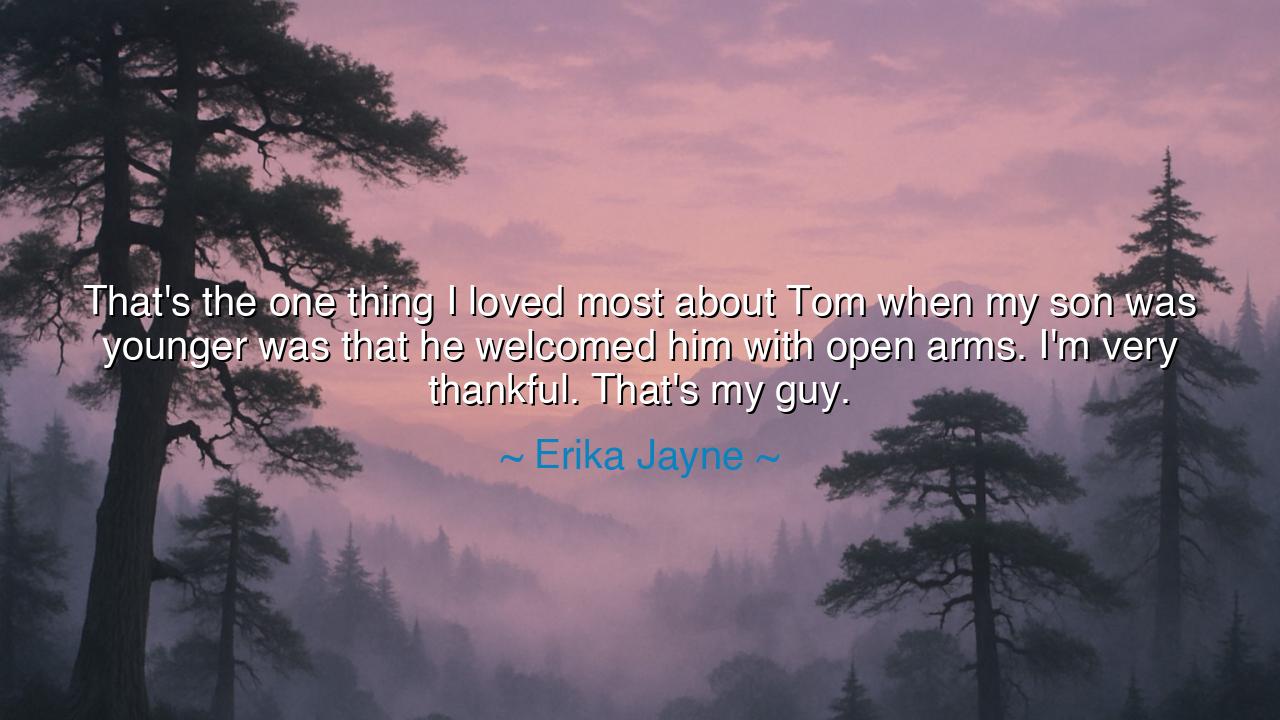
That's the one thing I loved most about Tom when my son was
That's the one thing I loved most about Tom when my son was younger was that he welcomed him with open arms. I'm very thankful. That's my guy.






When Erika Jayne speaks these words—“That’s the one thing I loved most about Tom when my son was younger was that he welcomed him with open arms. I’m very thankful. That’s my guy.”—she does not speak of wealth, fame, or worldly triumph. She speaks of something greater, something eternal: the acceptance of a child, the extension of love where there might have been distance, the forging of family not by blood alone, but by the will of the heart. This is the measure of a man—not what he gains, but what he embraces.
To welcome another’s child is to perform a sacred act. It is an opening of the heart, a declaration that “your joy shall be my joy, your burdens shall be my burdens.” In every age, the family has been the cornerstone of human endurance, and when one steps into the role of protector and guide for a child not born of their flesh, they join the company of the noblest spirits. Erika Jayne’s gratitude is not merely personal—it echoes the universal truth that the strength of a household lies in its capacity for acceptance.
Consider the story of Joseph, who took Mary and her infant Jesus into his care, though the child was not of his seed. With courage and humility, he raised the boy as his own, sheltering him from danger and giving him the foundation of family. Without his embrace, history itself might have been written differently. Like Joseph, Tom’s choice to welcome Erika’s son with open arms is not small; it is a gesture that creates stability, belonging, and love that ripple across generations.
The phrase “open arms” carries with it the essence of human warmth. Arms may defend, they may strike, they may build—but the arms that are open are the arms of peace. They invite trust, they diminish fear, they declare, “You are safe here.” To a child, especially, such an embrace becomes a fortress stronger than stone. It is a lesson to us all: if we wish to change the world, let us first learn to open our arms to those around us, most of all to the young, who carry tomorrow within their fragile hands.
Erika’s proclamation, “I’m very thankful,” teaches us that love unrecognized withers, but love acknowledged thrives. Gratitude keeps alive the memory of kindness. It is not enough to receive blessings; one must name them, honor them, and pass them forward. The act of speaking thanks breathes immortality into good deeds. Tom’s choice to embrace her son would remain noble even unspoken, but it becomes eternal when Erika lifts her voice in gratitude.
This quote also reminds us of loyalty—the phrase, “That’s my guy,” is a declaration of bond, a recognition that the man who loves her child earns not only respect but enduring allegiance. In this loyalty we glimpse a principle: true love is proven not by gifts of gold or words of promise, but by actions toward those most precious to us. Anyone can charm the eyes of a partner; only the worthy will extend kindness to their children.
The lesson, dear listener, is clear: if you would be great in love, learn to embrace not only the one who stands before you, but also those they carry with them—their children, their family, their history. When you do so with open arms, you become more than a companion; you become a guardian of legacy. And if you are the one who receives such love, be like Erika—be thankful, and speak it aloud, so that the light of gratitude may inspire others.
Therefore, I say: Let your arms be open, let your heart be generous, and let your tongue be quick to honor the good deeds done for you and yours. In this way, love is not only lived but passed down, like a torch that will never be extinguished.






AAdministratorAdministrator
Welcome, honored guests. Please leave a comment, we will respond soon